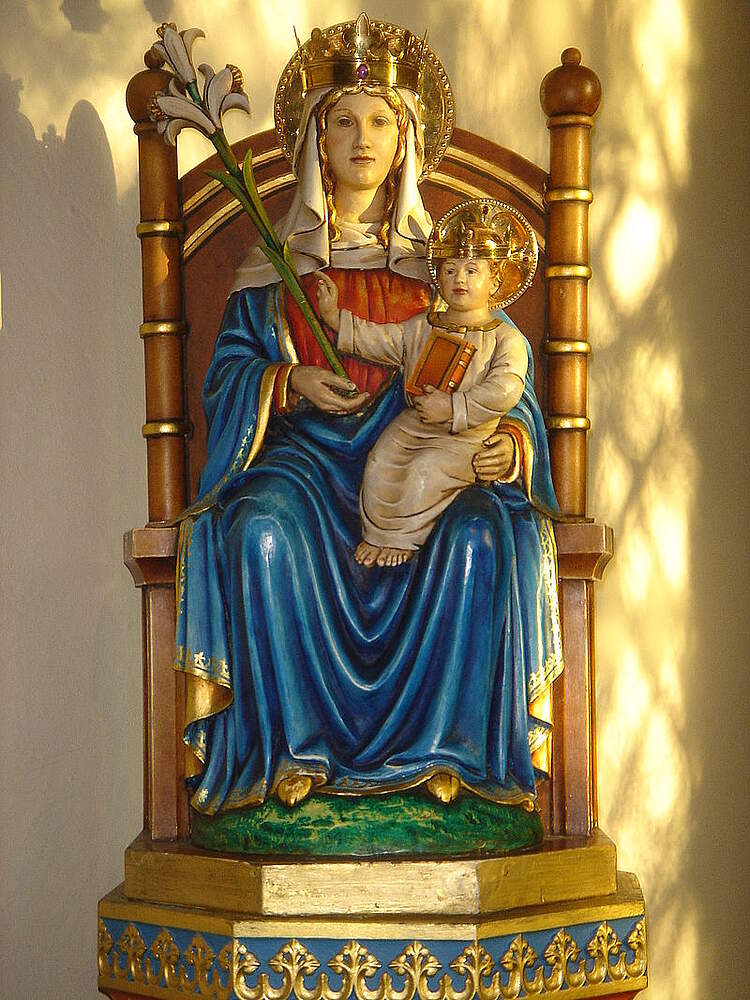
Our Lady of Walsingham, XIth century
Devotion to the Virgin Mary is an important issue in ecumenical dialogue. Because Marian doctrine is intimately related to the mystery of Christ and the Church, the various Churches or Christian denominations[1] refer to and perceive Mary’s role differently. All those who claim to be Christian have the desire in common to advance towards unity through dialogue and conversion, while being attentive to the voice of Christ and of the Holy Spirit. The hope is to attain an undivided Church while respecting each tradition. Although the path may seem long and beset with difficulties from a human viewpoint, Christians hope to receive heavenly assistance and to dialogue in truth.
Saint Pope John Paul II stated, during a general audience[2] :
« Non Catholic Christians have discovered the doctrine of the Church on the particular role of the Virgin Mary in salvation, and the example of virtues and sainthood Mary represents for all the Lord’s disciples. Additionally, the study of Luther and Calvin’s thought have contributed to a renewed attention by some Protestants and Anglicans to various themes of Mariological doctrine. For this reason, the Second Vatican Council rejoices in observing that the Blessed Virgin is also honoured by Christians who do not belong to the Catholic community, thus showing Mary’s universal motherhood. This fact, even if it makes the divisions among Christians seem all the sadder, represents a great sign of hope for the ecumenical journey ».
While awaiting full communion - a desire rekindled by Vatican Council II - the Virgin Mary, Mother of God, is a key element of communion between the Orthodox and Catholic Church, . It is important to underscore to what extent the understanding of the Virgin Mary and prayer have been enriched by both traditions. Far from being opposed, they complete each other. The Orthodox devotion to the Virgin Mary is tremendous, as expressed by Pope Saint John Paul II:
« Eastern Christians with devout mind and fervent impulse give honour to the Motherof God, a significant element of communion between Catholics and Othodox.[4] »
Promoting ecumenical dialogue involves setting forth the points of agreement and disagreement between both traditions, the Catholic and the Orthodox.
Catholics and Orthodox are in agreement about several dogmas, defined during the ecumenical councils[5] : the dogma of Mary’s divine maternity (Theotokos), according to the definition of the Council of Ephesus (431); that of Mary’s perpetual virginity, that of her sainthood (the Virgin Mary is called ‘Panagia’, the All-holy), and that of her role of intercession before her Son.
However, the Orthodox do not recognize the dogma of the Immaculate Conception, defined by Pope Pius IX in 1854[6], nor that of the Assumption[7], defined by Pope Pius XII in the Constitution Munificentissimus Deus on November 1st 1950[8]. Nevertheless, the Orthodox church celebrates the feast of Mary’s Conception in the womb of Saint Anne on December 9th and the Dormition of Mary - and not her Assumption - on August15th. Therefore, the feast day of the end of the Virgin Mary’s life is celebrated by both Catholics and Orthodox on August 15th since the VI century (this feast day was instituted by the Eastern Roman Emperor Mauritius).
Although Protestants may be attached to the person of Mary, they are not in agreement with Catholics about the place, role and cult of Mary. For Protestants,Scripture and free examination are the only basis for faith. Therefore, the Virgin Mary is no more important to them than that granted to her in the Bible, or that arising from personal choice. It is thus not possible to attribute to the Virgin Mary a role of mediation or of intercession. Because of this, Marian cult does not exist within Protestant churches. Besides, Protestants view with mistrust any Marian devotion, often suspecting idolatry. Similarly, Marian dogmas are not recognized by Protestants, because they are not based exclusively on Scripture. Therefore, they do not accept the dogma of the Immaculate Conception nor that of the Assumption.
Having said this, Protestants see in Mary a model of faith. In 1521, Martin Luther wrote a commentary on the Magnificat[9] in which he recognizes Mary as the Virgin and Mother of Christ, while John Calvin considers her a model of faith[10].
In order to promote interreligious dialogue, the theologians Paul Couturier and Laurent Remilleux founded in 1937 the Dombes Group[11], which, for seven successive years, brought together Catholic and Protestant (Reformed and Lutheran) theologians and specialists .
Anglicans are similar to Protestants in their beliefs about the Virgin Mary. However, they recognize the Virgin Mary’s divine maternity and venerate her; furthermore there are many statues of the Virgin Mary in Anglican churches. Additionally, the Virgin Mary finds a place in the liturgy as the Magnificat[12] is sung during the evening office.
On the other hand, an international Anglican-Catholic commission (known under the acronym ARCIC) was created in 1967, to favor ecumenical dialogue and find common positions on ethical issues. Within this context, an Anglican-Catholic agreement was reached on the dogma of the Assumption (ARCIC). On February 2, 2004, the ARCIC presented a common document “Mary : Grace and Hope in Christ”, in which the doctrine of the Assumption of Mary is presented as fully in accordance with Scripture[13].
Additionally, Pope Benedict XVI promulgated the Apostolic Constitution Anglicanorum coetibus[14] on November 4, 2009 and the Personal Ordinariate of Our Lady of Walsingham was created on January 15, 2011, to allow Anglicans to enter into full communion with the Catholic Church, while keeping a great part of their patrimony and their traditions. The Ordinariate is placed under the high patronage of Saint John Henry Newman (1801-1890), a former Anglican who became a Catholic and was created cardinal by Pope Leon XIII[15].
About the texts referring to various Christian traditions, see in the Marian Encyclopedia
About the development of doctrine, see in the Marian Encyclopedia